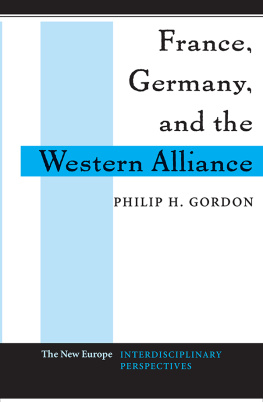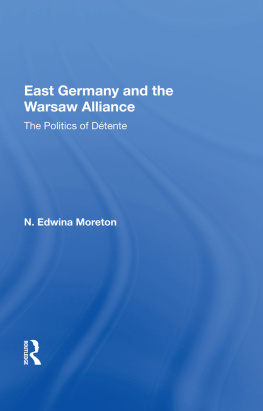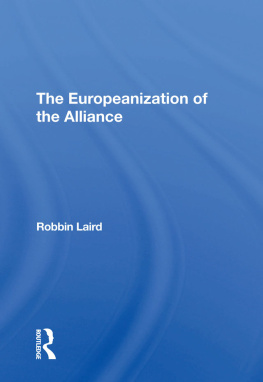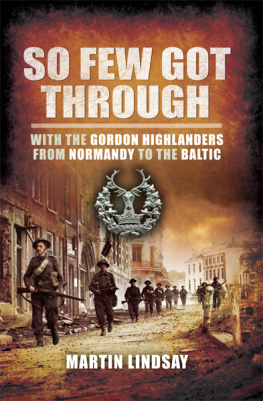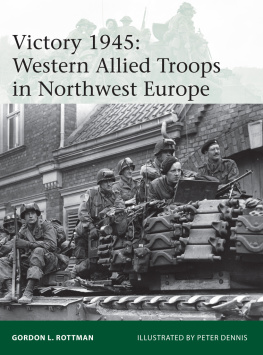France, Germany, and the Western Alliance
The New Europe: Interdisciplinary Perspectives
Stanley Hoffmann, Series Editor
France, Germany, and the Western Alliance
Philip H. Gordon
The European Sisyphus: Essays on Europe, 19641994
Stanley Hoffmann
FORTHCOMING
The European Union: Politics and Policies
John Spencer McCormick
Integrating Social Europe: The International Construction of a Democratic Polity Wolfgang Streeck
The New Europe: Interdisciplinary Perspectives
First published 1995 by Westview Press
Published 2018 by Routledge
711 Third Avenue, New York, NY 10017, USA
2 Park Square, Milton Park, Abingdon, Oxon 0X14 4RN
Routledge is an imprint of the Taylor & Francis Group, an informa business
Copyright 1995 Taylor & Francis
All rights reserved. No part of this book may be reprinted or reproduced or utilised in any form or by any electronic, mechanical, or other means, now known or hereafter invented, including photocopying and recording, or in any information storage or retrieval system, without permission in writing from the publishers.
Notice:
Product or corporate names may be trademarks or registered trademarks, and are used only for identification and explanation without intent to infringe.
A CIP catalog record for this book is available from the Library of Congress.
ISBN 13: 978-0-8133-2554-5 (pbk)
ISBN 13: 978-0-8133-2555-2 (hbk)
The thirtieth anniversary of the 1963 Elyse Treaty of Friendship and Cooperation between France and Germany gave leaders in the two countries the opportunity to celebrate the most successful example of bilateral reconciliation the world has ever known. Hereditary enemies that had fought three catastrophic wars between 1870 and 1945, France and Germany began in the early 1950s to accept one another as partners, codified that partnership under Charles de Gaulle and Konrad Adenauer in the 1963 treaty, and for the next thirty years went on to build a relationship so intimate that it became customary to refer to it in maritalrather than martialterms. The triumph of the reconciliation was that France and Germany not only overcame their hostile past and agreed on a peaceful coexistence but that the two countries actually formed a strategic partnership seen, correctly, as no less than an alliance within the alliance.
France and Germanys partners, however, have always viewed the Paris-Bonn couple with a certain ambivalence. On one hand, the allies were relieved to see the profound reconciliation of Western Europes two biggest states, and the Americans, in particular, appreciated the idea that France and Germany could assume some of the burdens of Western defense. On the other hand, however, most of France and Germanys allies have always been concerned that bilateralism or sub-structures within the alliance would undermine its common tasks. For the smaller states in Europe, the Franco-German condominium could produce the same kind of hegemony within Europe that French leaders said they were trying to avoid from Washington and could set an unhealthy precedent for bilateralism and faits accomplis. For the United States, Franco-German security cooperation has often seemed a plan to marginalize American leadership and to free Europe from its military dependence on, and thereby its political subordination to, the United States.
This study analyzes the Franco-German security partnership in the post-Cold War era and its implications for the Western alliance. Intended for readers on both sides of the Atlantic, it examines not only the content and prospects of Franco-German security cooperation in the post-Cold War era but also the potential advantages and perils of that bilateral cooperation for the European Union, NATO, and individual Western states. The study also identifies new national security policy trends in France and Germany and considers their implications for the West. It is my hope that the book will be of interest both to studentsfor whom I have included an historical overviewand to specialized observers of European affairs, who, like myself, have been trying to figure out whether France and Germany can really pursue common security policies in the post-Cold War world, and what their success or failure to do so means for the United States and their other allies.
The future of the Franco-German security partnership is important not only for the French and the Germans themselves but for the rest of Europe and the United States. For Europe, agreement between Paris and Bonn is the key to any potential common foreign and security policy andas subsequent chapters will showthere is little chance of coherent European policy when France and Germany do not manage to coordinate their analyses, policies, and means. For the United States, Franco-German cooperation can provide the leadership of the European pillar that Americans have always professed to support and, thereby, help to reduce some of the international duties and costs for the United States at a time when American resources are increasingly limited. If mismanaged, however, Franco-German security cooperation could create divisions within the European Union and drive the United States out of a European rolewithout leaving anything dependable or effective in its place.
This book is divided into four parts. Chapter 1 examines the development of Franco-German security cooperation since World War ? and addresses the question of strategic culture in the two countries. It argues that although the development of the partnership over those four decades was truly remarkable, France and Germany never really managed to develop common views and perspectives on the most basic issues of national security, the use of military force, and alliance relations. Postwar Franco-German security cooperation was thus a product of the Cold War; this does not necessarily mean that the partnership will wither, but it does mean that its resilience under the present circumstances is untested.
Chapter 2 places the Franco-German partnership in its new context and argues that the challenges of the post-Cold War world will be greater than those faced during the Cold War. With the Soviet threat gone, Germany unified, the American role in Europe uncertain, and great potential for instability to Europes east and south, Franco-German cooperation will be more difficult and less natural than in the past. The chapter also examines four important aspects of the France-Germany-Atlantic Alliance security relationship since 1989the Persian Gulf War, the debates over the Eurocorps, policies toward Eastern Europe (and the former Soviet Union), and the war in former Yugoslavia. The analysis demonstrates an ongoing and determined effort in Paris and Bonn to coordinate and integrate their security policies but a persistent inability to reach truly common positions or to build adequate means to implement them. These case studies also provide evidence that France and Germany are as likely to share security policy positions with other Western allies as they are with each other.
Chapter 3 identifies and discusses new trends in French and German security policies since 1989. These include, for France, a more cooperative attitude toward the United States and NATO, a continued desire to play a prominent global security role, and a growing preoccupation with Germany. In Germany, the trends include continued support for the United States and NATO, a growing (but still highly circumscribed) willingness to play an international security role, and a declining relative interest in France. From an alliance perspective, the trends in both countries have both positive and negative elements; they suggest the possibility for much improved cooperation and burden-sharing within NATO, for example, but could also lead to divergence in French, German, and other allied interests and perceptions.


